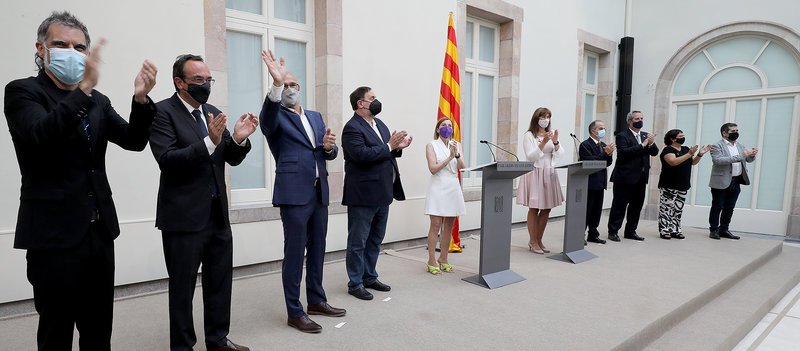So what next?
The pardoning of the jailed Catalan leaders sheds little light on the future of the others pursued by the Spanish judiciary for their part in the 2017 push for independence
feature politics
Partial, conditional and reversible. Three adjectives that describe the pardons that the Pedro Sánchez government granted to the nine pro-independence leaders over 1,300 days since they were locked up for trying to achieve the independence of Catalonia. The conditional nature of the pardons will likely make many in Catalonia think that the leaders have merely been released on parole. The pardons are partial in that they apply to the leaders’ prison sentences but not to their disqualification from holding public office. The pardons can also be reversed and the Spanish authorities have warned that they will monitor the leaders and return them to prison should they commit a “serious” crime during a period of three and six years, depending on the individual. However, this also raises the question of what is meant by a serious crime, and who will decide the gravity of any offence the leaders may commit.
After leaving prison in June, all nine prisoners made it clear that this reprieve will not make them give up the fight for what they consider Catalonia’s national rights and the best way of achieving a more just and balanced country.
At the same time, socialist MPs feel that the pardons give them the right to expect “gestures” in return from the Catalan independence movement. The first gesture is agreeing to a two-year margin for dialogue between the Spanish and Catalan authorities, talks that have so far achieved little more than granting Sánchez the votes he needed to become prime minister.
The measure approved by the Spanish cabinet reveals Sánchez as a true juggler of words, as terms like concord and coexistence are now his mantras. Despite criticism from different European bodies – the latest being the Council of Europe – associating the pardons with a window dressing operation aimed at cleaning up the image of Spanish justice, some sectors of society see the pardons as ushering in a new era of cordiality in relations between Catalonia and Spain.
What about the rest?
In short, all the pardons do is partially solve the situation of nine high profile people forced to pay the highest price after the Spanish state began the crackdown on the independence movement. What they don’t address is the situation of over 3,000 other people, many of whom are outside the political sphere, who in some way contributed to the independence push and are still involved in lawsuits. And there is no solution for these people in sight. Meanwhile, the Court of Auditors is prosecuting around 40 people related to the Catalan government’s actions abroad. The Catalan leaders who were imprisoned are aware that the solution of pardons applies only to them and have vowed to support the others who are still being prosecuted.
As for former Catalan president Carles Puigdemont and ministers and officials in his government who sought refuge abroad in 2017, despite some victories in court they have not yet been able to return. It seems that only a reform of the sedition laws could open the door to that, although the Spanish government has stated that they will not be absolved without first passing through the courts. Sánchez’s willingness to find a way out for such people is also likely to change as his bid for re-election in 2023 approaches.
The Spanish prime minister, who has spoken out against pardons for the Catalan leaders and in favour of them serving their full sentences on several occasions, now calculates that the measure will strengthen Spain’s unity, improve the country’s image in the face of the former prisoners’ appeals in the European Court of Human Rights, and help deflate the desire for Catalan independence. This is the narrative thread upon which much of his current argument hangs, especially among those in his own sphere of influence.
Pardons a la carte
It took a four-hour meeting on June 22 for the Spanish cabinet to agree to pardons for the nine independence leaders who have been imprisoned since the 2017 independence referendum. The pardons are personalised with the conditions set out in a 34-page document for each person concerned. While each pardon has its own nuances depending on who it applies to, they all state that the reason for them is to “reduce tension and resolve the deep social and political crisis that has for too long been eroding social peace.” Twenty-four hours after the pardons were approved, the nine leaders were released from prison.

